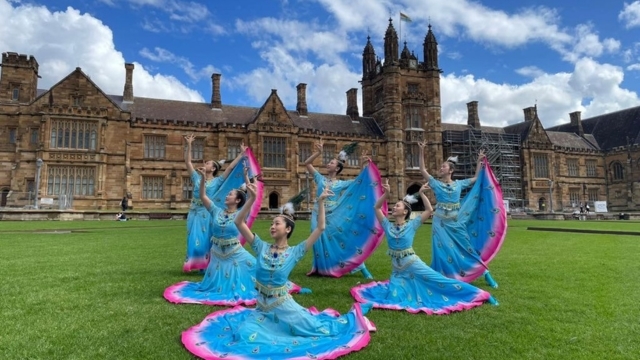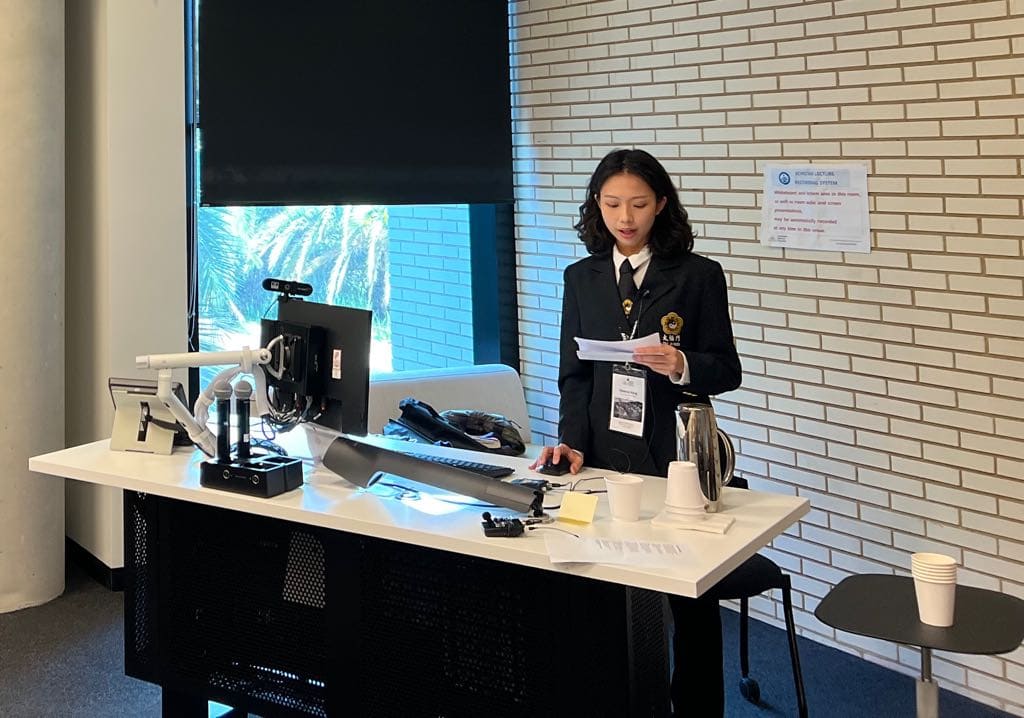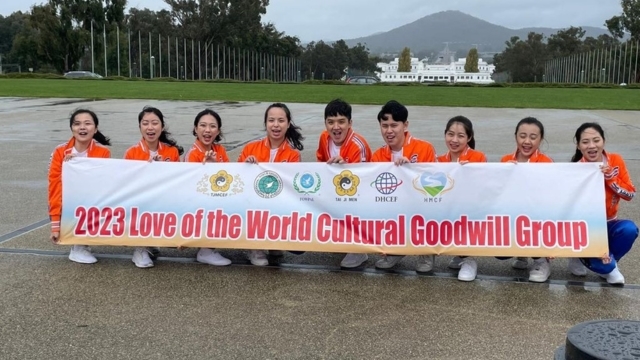Three academic events offered the opportunity to present the Tai Ji Men case to numerous Australian and international scholars. Young Tai Ji Men dizi (disciples) also offered beautiful performances.
by Massimo Introvigne

Tai Ji Men qigong and martial arts performers are not unknown in Australia, as they were invited in 2000 to perform at the Sydney Olympic Games. In April 2023, however, Tai Ji Men performances and academic discussions of their case within the context of regional issues of freedom of religion or belief in East Asia and Taiwan were proposed in three Australian academic events.
First, a large conference gathered scholars from all over the world at Australian National University (ANU) in the country’s capital, Canberra, from April 13 to 15. ANU yearly conferences on religion were an important international academic event before the COVID pandemic, and started again with the 2023 edition, whose theme was the relationship between religions and education.
On April 14, Tai Ji Men dizi (disciples) offered a spectacular show featuring their acclaimed “sword dance,” martial arts demonstrations, and songs. They generated a contagious enthusiasm, so much so that several scholars joined the performers and danced with them. Professor David Kim, the main organizer of the conference, delivered to Tai Ji Men a “certificate for outstanding performance.”

On April 15, one of the concluding sessions of the conference was devoted to “Conscience Education, Spiritual Movements, and Conflict in Taiwan: The Tai Ji Men Case.” I introduced and concluded the session, discussing issues of religious liberty in Taiwan during the Martial Law era and the post-authoritarian period that in fact continued until the end of the 20th century. It had an important moment in the 1996 politically motivated crackdown against several religious movements, which also hit Tai Ji Men, whose Shifu (leader) was detained together with his wife and two dizi (eventually, they were declared innocent of all charges).
Tai Ji Men’s worldview as a menpai (similar to a school) rooted in esoteric Taoism but open to dizi of all religions, who learn martial arts, qigong, kung fu, self-cultivation, and travel to all continents promoting peace education, love, and the primacy of conscience was presented by Chen Yi-Shuan, a Taiwanese dentist. She explained the relationship between Shifu (Grand Master), Dr. Hong Tao-Tze, and dizi of Tai Ji Men as similar to a father-children relationship, and not too different from the one she established with her medical mentors when she learned how to become a good dentist. Chen also presented the recent trips in 2022 and 2023 of Dr. Hong and his dizi to Sweden, Turkey, and the United States.

Rosita Šorytė, of the European Federation for Freedom of Belief and a former diplomat with a long experience at the United Nations, explained how the process leading the U.N. General Assembly to add a new day of observance to the U.N. calendar works. It is possible that this process is started by the “diplomacy from below” of private organizations, she said, but results can only obtained when the latter work effectively together with the “diplomacy from above” of member states.
In the case of the International Day of Conscience, April 5, which became a new U.N. day of observance in 2019, Šorytė said, Tai Ji Men and its Shifu, Dr. Hong, showed considerable skills in understanding how the United Nations work, and in cooperating with several member states to achieve what was a remarkable result. She also noted that Dr. Hong has now proposed three new days of observance, the World Prayer Day, the World Day of the Power of Hope, and the International Day Against Judicial and Tax Persecution by State Power.
Rebecca Wang, a project coordinator in a technology company who has been a Tai Ji Men dizi for over 27 years, reported her experiences as a performer at the 2017 Universiade in Taipei and when she accompanied Dr. Hong to the 18th International Conference of Chief Justices of the World in Lucknow, India, in the same year 2017.
The focus of her presentation was a remarkable synthesis of the Tai Ji Men case, from its origins in the 1996 crackdown to the decisions that declared the Shifu and his co-defendants innocent of all charges, including the final one by the Supreme Court in 2007, and to the absurd continuation of the movement’s harassment through ill-founded tax bills even after 2007, and indeed to this very day.
Wang explained the rationale of the massive street protests in Taiwan and the United States that followed the confiscation, unsuccessful auction, and seizure of Tai Ji Men’s sacred land intended for a spiritual center in 2020, based on the last remaining tax bill, the one for the year 1992, which had been maintained due to a technicality after all the others had been corrected to zero.

All the speakers expressed the hope that, particularly after the recent visit by a delegation of scholars and freedom of religion experts to Taiwan, the Tai Ji Men case may quickly find a just political solution.
On April 17, another event was held at the oldest Australian university, the University of Sydney. Presented by Dr. Christopher Humphrey Hartney, senior lecturer in the Department of Studies in Religion and a well-known expert in Asian religions, the even consisted of two parts. In the first, I presented the Tai Ji Men case within the context of Taiwan’s difficult path to democracy, freedom of religion or belief, and transitional justice (i.e., the rectification of human rights abuses perpetrated by a past authoritarian regime).
I noted that important results have been achieved, but the case of Tai Ji Men demonstrates that there are still remnants of the authoritarian past and issues that need to be solved. In the second part, Tai Ji Men performers showed the essence and spirit of the Tai Ji Men culture based on qigong, peace, love, and conscience through songs and dances, including the applauded Peacock Dance.

The event was honored by the participation of Professor Garry Trompf, Emeritus Professor in the History of Ideas at the University of Sydney and one of Australia’s greatest living scholars, as well as a world authority on indigenous religions and the interaction between religions and politics, and of Dr. Zoe Alderton, a lecturer at the University of Sydney’s School of Economics and a well-known specialist of communication studies and contemporary religion. It was concluded with the presentation by Dr. Hartney of a certificate of appreciation to Tai Ji Men on behalf of the university.

Also on April 17, I gave a lecture as part of their “Eminent Speakers Series” at Sydney’s University of Notre Dame, Australia’s oldest Roman Catholic university. I was introduced by Professor Michael Quinlan, National Head of School at Notre Dame’s School of Law and Business, and by Professor Keith Thompson, Professor and Associate Dean in Law at the university, and an internationally recognized expert on freedom of religion or belief. The topic of my lecture was how throughout the world, in different ways, movements stigmatized as “cults,” “xie jiao,” or “extremist groups” are slandered by the media and discriminated by the authorities.
I summarized the Tai Ji Men case as one example of what is an international phenomenon with many different national variations, and explained its Taiwanese context and background. In the end, Tai Ji Men dizi sang for the audience and shortly introduced their culture of love and peace. The University of Notre Dame will also deliver to them a certificate of appreciation.

The three events were an opportunity to introduce Tai Ji Men as a menpai, its activities on behalf of peace, love, and conscience, and the Tai Ji Men case to numerous Australian scholars and others who came from abroad to the ANU conference.
The Tai Ji Men dizi also visited the main Thai Buddhist temple and the main Islamic mosque in Canberra, engaging in a respectful dialogue with local religious leaders, and even had the opportunity of spotting a tribe of kangaroos in one of the parks of the Australian capital and learn about Australia’s national animal. Their visible enthusiasm, happiness, and joy were the best way of showing to the scholars what Tai Ji Men and their quest for peace, conscience, and human rights are all about.

Source: Bitter Winter

